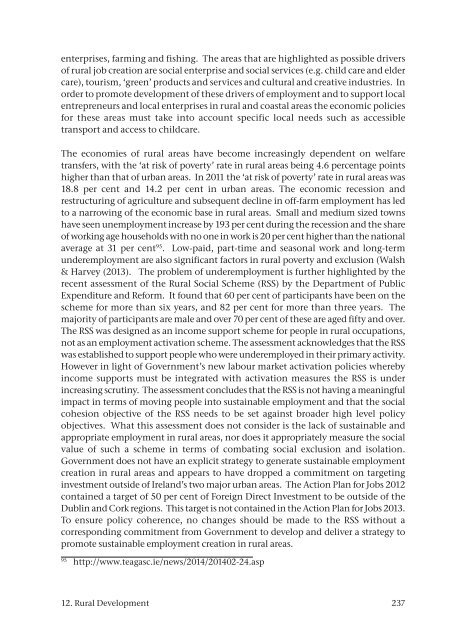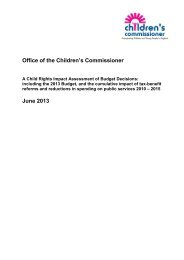2014-04-22 - Socio Economic Review 2014 - Full text and cover - FINAL
2014-04-22 - Socio Economic Review 2014 - Full text and cover - FINAL
2014-04-22 - Socio Economic Review 2014 - Full text and cover - FINAL
You also want an ePaper? Increase the reach of your titles
YUMPU automatically turns print PDFs into web optimized ePapers that Google loves.
enterprises, farming <strong>and</strong> fishing. The areas that are highlighted as possible drivers<br />
of rural job creation are social enterprise <strong>and</strong> social services (e.g. child care <strong>and</strong> elder<br />
care), tourism, ‘green’ products <strong>and</strong> services <strong>and</strong> cultural <strong>and</strong> creative industries. In<br />
order to promote development of these drivers of employment <strong>and</strong> to support local<br />
entrepreneurs <strong>and</strong> local enterprises in rural <strong>and</strong> coastal areas the economic policies<br />
for these areas must take into account specific local needs such as accessible<br />
transport <strong>and</strong> access to childcare.<br />
The economies of rural areas have become increasingly dependent on welfare<br />
transfers, with the ‘at risk of poverty’ rate in rural areas being 4.6 percentage points<br />
higher than that of urban areas. In 2011 the ‘at risk of poverty’ rate in rural areas was<br />
18.8 per cent <strong>and</strong> 14.2 per cent in urban areas. The economic recession <strong>and</strong><br />
restructuring of agriculture <strong>and</strong> subsequent decline in off-farm employment has led<br />
to a narrowing of the economic base in rural areas. Small <strong>and</strong> medium sized towns<br />
have seen unemployment increase by 193 per cent during the recession <strong>and</strong> the share<br />
of working age households with no one in work is 20 per cent higher than the national<br />
average at 31 per cent 95 . Low-paid, part-time <strong>and</strong> seasonal work <strong>and</strong> long-term<br />
underemployment are also significant factors in rural poverty <strong>and</strong> exclusion (Walsh<br />
& Harvey (2013). The problem of underemployment is further highlighted by the<br />
recent assessment of the Rural Social Scheme (RSS) by the Department of Public<br />
Expenditure <strong>and</strong> Reform. It found that 60 per cent of participants have been on the<br />
scheme for more than six years, <strong>and</strong> 82 per cent for more than three years. The<br />
majority of participants are male <strong>and</strong> over 70 per cent of these are aged fifty <strong>and</strong> over.<br />
The RSS was designed as an income support scheme for people in rural occupations,<br />
not as an employment activation scheme. The assessment acknowledges that the RSS<br />
was established to support people who were underemployed in their primary activity.<br />
However in light of Government’s new labour market activation policies whereby<br />
income supports must be integrated with activation measures the RSS is under<br />
increasing scrutiny. The assessment concludes that the RSS is not having a meaningful<br />
impact in terms of moving people into sustainable employment <strong>and</strong> that the social<br />
cohesion objective of the RSS needs to be set against broader high level policy<br />
objectives. What this assessment does not consider is the lack of sustainable <strong>and</strong><br />
appropriate employment in rural areas, nor does it appropriately measure the social<br />
value of such a scheme in terms of combating social exclusion <strong>and</strong> isolation.<br />
Government does not have an explicit strategy to generate sustainable employment<br />
creation in rural areas <strong>and</strong> appears to have dropped a commitment on targeting<br />
investment outside of Irel<strong>and</strong>’s two major urban areas. The Action Plan for Jobs 2012<br />
contained a target of 50 per cent of Foreign Direct Investment to be outside of the<br />
Dublin <strong>and</strong> Cork regions. This target is not contained in the Action Plan for Jobs 2013.<br />
To ensure policy coherence, no changes should be made to the RSS without a<br />
corresponding commitment from Government to develop <strong>and</strong> deliver a strategy to<br />
promote sustainable employment creation in rural areas.<br />
95<br />
http://www.teagasc.ie/news/<strong>2014</strong>/<strong>2014</strong>02-24.asp<br />
12. Rural Development 237



